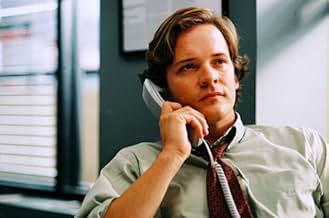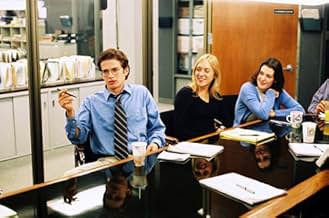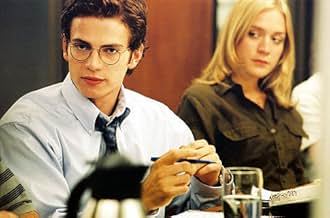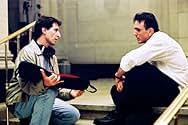La historia de un joven periodista que cayó en desgracia al ser descubierto que se inventó más de la mitad de sus artículos en la publicación The New Republic.La historia de un joven periodista que cayó en desgracia al ser descubierto que se inventó más de la mitad de sus artículos en la publicación The New Republic.La historia de un joven periodista que cayó en desgracia al ser descubierto que se inventó más de la mitad de sus artículos en la publicación The New Republic.
- Premios
- 11 premios ganados y 28 nominaciones en total
Owen Roth
- Ian Restil
- (as Owen Rotharmel)
- Dirección
- Guionistas
- Todo el elenco y el equipo
- Producción, taquilla y más en IMDbPro
Opiniones destacadas
As the film opens we meet Stephen Glass, a rising star at "The New Republic" magazine. He's sensitive, friendly and unfailingly polite. And, oh yeah, did I mention he was on everybody's hot list? He was being wooed by everyone from "George Magazine" to "Harper's" to the "New York Times." Unfortunately, behind the Glass juggernaut was a compulsive liar who took everyone for a downhill ride. You see, Glass fabricated over 20 stories, inventing sources, locations, times, dates, and companies.
Hayden Christensen was fabulous as the ingratiating/creepy Glass. As a CNN.com reviewer pointed out, this movie proves he can act.
Christensen's Glass is the ultimate likeable co-worker, who remembers everyone's birthday, knows how everyone takes their coffee and is so self-deprecatingly sweet that when things start unraveling you feel sorry for him. Despite his audacious lies and deceits, you like him and wonder why everyone is being so mean. Christensen walks the fine line between good and evil so well, you watch in amazement. You feel sorry for him, you're repulsed by him, you're embarrassed for him...
At times I turned to my friend and said "Man! Is this hard to watch." And it was.
Peter Sarsgaard, who plays Glass' editor, Chuck Lane, is wonderfully understated as the misunderstood editor. (For those at home who care, he's also really cute in that nerdy handsome way.)
The movie incisively exposes the world of journalism -- with it's big egos, pedantic copy editors, and ultra-competitive writers. I could see many of my co-workers (current and former) in the archetypes portrayed on screen (the braggart, the attention getter, the know-it-all, the guy who will split the most microscopic of hairs just for the heck of it).
It also brings home the incredible responsibility on the shoulders of journalists. It's easy to forget this responsibility in pursuit of personal glory or attention, but it's the reader who gets hurt. Everyone in the business of journalism should see this movie. But with its twists and turns and shocking (yet true!) events, it's a movie for anyone who enjoys a good thriller.
Hayden Christensen was fabulous as the ingratiating/creepy Glass. As a CNN.com reviewer pointed out, this movie proves he can act.
Christensen's Glass is the ultimate likeable co-worker, who remembers everyone's birthday, knows how everyone takes their coffee and is so self-deprecatingly sweet that when things start unraveling you feel sorry for him. Despite his audacious lies and deceits, you like him and wonder why everyone is being so mean. Christensen walks the fine line between good and evil so well, you watch in amazement. You feel sorry for him, you're repulsed by him, you're embarrassed for him...
At times I turned to my friend and said "Man! Is this hard to watch." And it was.
Peter Sarsgaard, who plays Glass' editor, Chuck Lane, is wonderfully understated as the misunderstood editor. (For those at home who care, he's also really cute in that nerdy handsome way.)
The movie incisively exposes the world of journalism -- with it's big egos, pedantic copy editors, and ultra-competitive writers. I could see many of my co-workers (current and former) in the archetypes portrayed on screen (the braggart, the attention getter, the know-it-all, the guy who will split the most microscopic of hairs just for the heck of it).
It also brings home the incredible responsibility on the shoulders of journalists. It's easy to forget this responsibility in pursuit of personal glory or attention, but it's the reader who gets hurt. Everyone in the business of journalism should see this movie. But with its twists and turns and shocking (yet true!) events, it's a movie for anyone who enjoys a good thriller.
One of the unsung and unheralded movie treasures of 2003, 'Shattered Glass' tells the fascinating story of Stephen Glass, one of the top reporters for The New Republic in the 1990's, who rocked the media world when he had to finally confess that he had fabricated many of his stories. 'Shattered Glass' plays like a modern Greek tragedy, centered on a man of great talent and potential brought down by his own internal weaknesses. Glass was only 24 when he fell from grace; prior to that, he was a hot shot reporter who, in the highly competitive world of high stakes journalism, kept looking for that little added edge to make his stories saleable. For a number of years, Glass managed to slip those stories past his editors and fact-checkers without being discovered. However, in the spring of 1998, his world came crashing down around him after an internet magazine became suspicious of a story he had written about a computer hacker who, it turns out, never actually existed.
'Shattered Glass,' which is based on an article by Buzz Bissinger, succeeds as both a complex character study and a top notch thriller. The film never gives us any easy answers as to just why Glass put his journalistic integrity and career on the line by perpetrating these frauds. As portrayed in the film, Glass is a paradoxical mixture of both arrogance and insecurity, a smooth manipulator who can charm and sweet talk his way into getting people to like and trust him while at the same time employing those same skills to get himself out of tough situations. Eventually, however, the act runs out of steam and he is exposed for who and what he really is. Yet, who, indeed, is he? Is Glass simply a pathological liar? Is he a stressed-out, overworked 'kid' trying desperately to keep his head above water in the cutthroat world of professional journalism? Is he merely a smooth-talking, unethical charmer who knows what he wants and will stop at nothing to get it? Could it be that he is some or all of these things at the same time? The fact that the film never fully answers these questions is what pulls us so deeply into the drama. Moreover, Hayden Christensen gives a superb performance as Glass, making the character both smarmy and vulnerable, repellant and sympathetic all at the same time. In addition to Christensen, the film is filled with brilliant, subtle performances by Peter Sarsgaard, Chloe Sevigny, Hank Azaria and many others.
Superbly written and directed by Billy Ray, 'Shattered Glass' is one of the most suspenseful films of recent times, far more gripping than most so-called thrillers because the film is dealing with real-world issues of integrity and ethics. We watch with morbid fascination the slow unraveling of a man's 'crime' and character, as Glass becomes more and more ensnared in a web of his own making. The step-by-step process by which a promising young man's true nature is uncovered, then his reputation destroyed, becomes the stuff of classic tragedy.
Although The New Republic eventually recovered from this debacle, the filmmakers do not let the magazine off the hook quite so easily. The thing we are most struck by is how incredibly young the reporters at the magazine were at the time (we are told their average age was 26!). How such unseasoned writers came to play so prominent a part in so major and venerable a publication is indeed one of the great mysteries of the story - and one of the sharpest indictments leveled against the magazine by the makers of the film.
'Shattered Glass' is an ineffably sad film, one that makes us mourn the loss of a promising, talented individual who sowed the seeds of his own destruction (he is currently a lawyer). Yet it also inspires and uplifts us by reminding us that men of integrity will almost always triumph over men of little or no integrity in the long run. That's a truism worth remembering in this time of great moral confusion in which we find ourselves living. 'Shattered Glass' is not to be missed.
'Shattered Glass,' which is based on an article by Buzz Bissinger, succeeds as both a complex character study and a top notch thriller. The film never gives us any easy answers as to just why Glass put his journalistic integrity and career on the line by perpetrating these frauds. As portrayed in the film, Glass is a paradoxical mixture of both arrogance and insecurity, a smooth manipulator who can charm and sweet talk his way into getting people to like and trust him while at the same time employing those same skills to get himself out of tough situations. Eventually, however, the act runs out of steam and he is exposed for who and what he really is. Yet, who, indeed, is he? Is Glass simply a pathological liar? Is he a stressed-out, overworked 'kid' trying desperately to keep his head above water in the cutthroat world of professional journalism? Is he merely a smooth-talking, unethical charmer who knows what he wants and will stop at nothing to get it? Could it be that he is some or all of these things at the same time? The fact that the film never fully answers these questions is what pulls us so deeply into the drama. Moreover, Hayden Christensen gives a superb performance as Glass, making the character both smarmy and vulnerable, repellant and sympathetic all at the same time. In addition to Christensen, the film is filled with brilliant, subtle performances by Peter Sarsgaard, Chloe Sevigny, Hank Azaria and many others.
Superbly written and directed by Billy Ray, 'Shattered Glass' is one of the most suspenseful films of recent times, far more gripping than most so-called thrillers because the film is dealing with real-world issues of integrity and ethics. We watch with morbid fascination the slow unraveling of a man's 'crime' and character, as Glass becomes more and more ensnared in a web of his own making. The step-by-step process by which a promising young man's true nature is uncovered, then his reputation destroyed, becomes the stuff of classic tragedy.
Although The New Republic eventually recovered from this debacle, the filmmakers do not let the magazine off the hook quite so easily. The thing we are most struck by is how incredibly young the reporters at the magazine were at the time (we are told their average age was 26!). How such unseasoned writers came to play so prominent a part in so major and venerable a publication is indeed one of the great mysteries of the story - and one of the sharpest indictments leveled against the magazine by the makers of the film.
'Shattered Glass' is an ineffably sad film, one that makes us mourn the loss of a promising, talented individual who sowed the seeds of his own destruction (he is currently a lawyer). Yet it also inspires and uplifts us by reminding us that men of integrity will almost always triumph over men of little or no integrity in the long run. That's a truism worth remembering in this time of great moral confusion in which we find ourselves living. 'Shattered Glass' is not to be missed.
A young D.C. journalist (new "Star Wars" trilogy star Hayden Christensen) for The New Republic political magazine falsifies data and produces fraudulent stories. Slowly but surely his would-be meteoric rise turns into a dizzying downfall. "Boys Don't Cry" alums Peter Saarsgard and Chloe Sevigny are out of this world as Christensen's editor and supportive co-worker. Based on a true story, the picture has a tense documentary feel to it that makes it highly engrossing and fascinating early. The production does begin to tire late though as Christensen's crazed personality starts to come shining through with dementedly over-the-top results. Still a well-paced and intelligent take on American journalism and the pressures associated with the field. Worth a legitimate chance. 4 stars out of 5.
This fascinating study of journalistic malpractice is not only one of the best American films of 2003, but the best movie about journalism itself since ALL THE PRESIDENT'S MEN. It's a complex, intimate character study that's simultaneously tragic and funny thanks to a brilliant performance by Hayden Christensen, who in his portrayal of New Republic writer Stephen Glass is almost nauseatingly amoral yet strangely sympathetic--like the other characters in the film (all of whom are excellently played by the best ensemble cast since TRAFFIC), the viewer roots for Glass to be innocent of journalistic fraud in spite of all the evidence to the contrary. And if the movie is entertaining and emotionally involving on the micro-level of ensemble character study, on the macro-level of social and historical sweep it's an absolute masterpiece, a witty and terrifying satire about what Americans want from their news media and how easy it is to lie and be lied to in a society that values sensationalism over substance. First-time director Billy Ray uses the 'scope frame expressively yet with subtlety and restraint--there isn't a moment in this film in which the camera fails to find the perfect way of emphasizing the dynamic drama that's already there on the page and in the performances.
Stephen Glass (Hayden Christensen) is a young ace reporter for The New Republic. The magazine is heralded as the inflight magazine of Air Force One. Glass is personable and his stories are fabulously enticing. He expertly weaves his fables with panache. Chuck Lane (Peter Sarsgaard) is originally a reporter, but then gets elevated to editor. Chuck is the exact opposite of Glass. He is reserved, and stickler for the work. As a reporter, he struggles to keep up with Glass's flashier stories. As an editor, nobody trusts him. When Glass's article on computer hackers is questioned by an online publication, things spin out of control.
The true story is shocking. And the movie portrays it with realism. This is probably Hayden's greatest performance. He has the boyish charm that makes all those lies believable. But he also has a twitchy quality about him. It's also believable that he made up all those lies. This is infinitely better than the Star Wars debacle. Peter Sarsgaard has that quiet intensity that is perfect for his role.
The only thing I didn't like was the older lady at the end when she says that if only they had pictures.... That's not necessarily any solution. Pictures can be doctored just as easily. And pictures can distract any fact checkers. I don't know if somebody actually said that in real life. But it's one line that I'd rather cut out.
I think it's too bad that Hayden Christensen will always have the Star Wars movies hanging over him. It overshadows some good work in this movie. He needs to find these types of roles that can challenge his acting skills.
The true story is shocking. And the movie portrays it with realism. This is probably Hayden's greatest performance. He has the boyish charm that makes all those lies believable. But he also has a twitchy quality about him. It's also believable that he made up all those lies. This is infinitely better than the Star Wars debacle. Peter Sarsgaard has that quiet intensity that is perfect for his role.
The only thing I didn't like was the older lady at the end when she says that if only they had pictures.... That's not necessarily any solution. Pictures can be doctored just as easily. And pictures can distract any fact checkers. I don't know if somebody actually said that in real life. But it's one line that I'd rather cut out.
I think it's too bad that Hayden Christensen will always have the Star Wars movies hanging over him. It overshadows some good work in this movie. He needs to find these types of roles that can challenge his acting skills.
¿Sabías que…?
- TriviaThe real Stephen Glass was offered a role. He declined.
- ErroresAt 47:59 there is an overlay on the screen saying it is May 8, 1998, and lane is going in to discuss the fallout from the article Hack Heaven. But the article had been published May 18th, 1998.
- Citas
Stephen Glass: [Outside the closed restaurant] I didn't do anything wrong, Chuck.
Chuck Lane: I really wish you'd stop saying that.
- Versiones alternativasThere are three versions available, of different lengths. Runtimes are: "1h 34m (94 min)", the most available, theatrical cut, "1h 29m (89 min) (Australia)" and "1h 39m (99 min) (Toronto International) (Canada)" film festival original cut.
- Bandas sonorasWild Thing
Written by Chip Taylor
Performed by X
Used by permission of EMI Blackwood Music Inc.
Courtesy of Elektra Entertainment Group
By Arrangement with Warner Strategic Marketing
Selecciones populares
Inicia sesión para calificar y agrega a la lista de videos para obtener recomendaciones personalizadas
- How long is Shattered Glass?Con tecnología de Alexa
Detalles
- Fecha de lanzamiento
- Países de origen
- Idioma
- También se conoce como
- Shattered Glass
- Locaciones de filmación
- Productoras
- Ver más créditos de la compañía en IMDbPro
Taquilla
- Presupuesto
- USD 6,000,000 (estimado)
- Total en EE. UU. y Canadá
- USD 2,220,008
- Fin de semana de estreno en EE. UU. y Canadá
- USD 77,540
- 2 nov 2003
- Total a nivel mundial
- USD 2,944,752
- Tiempo de ejecución1 hora 34 minutos
- Color
- Mezcla de sonido
- Relación de aspecto
- 2.35 : 1
Contribuir a esta página
Sugiere una edición o agrega el contenido que falta

Principales brechas de datos
By what name was El precio de la verdad (2003) officially released in India in English?
Responda






































